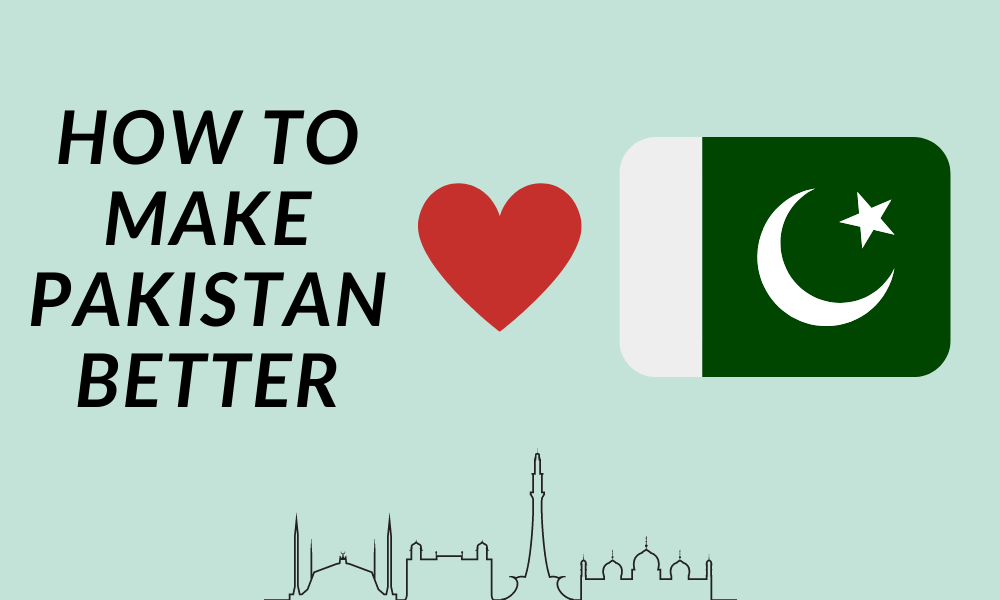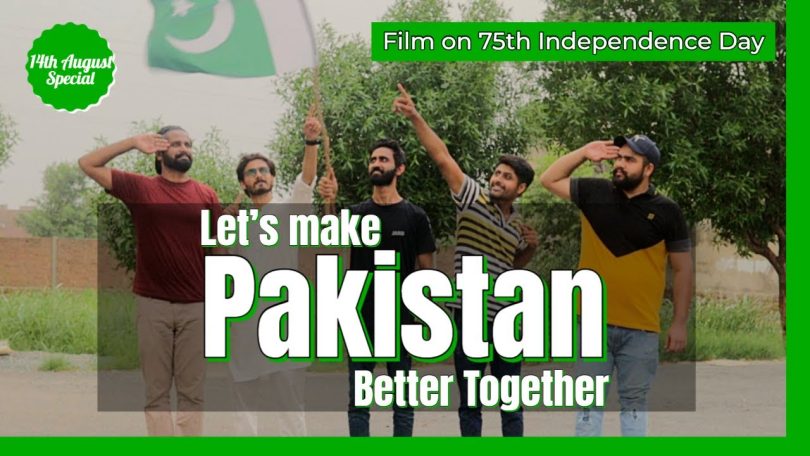Let’s Make Pakistan Better Together
Pakistan is a country with immense potential and rich cultural heritage. However, like many developing nations, it also faces a multitude of challenges that threaten to hold back its progress. From economic struggles to social inequality, education shortcomings to environmental degradation, the road to a better future for Pakistan is a long and difficult one.
Despite these challenges, there is hope. The country is home to a vibrant and dynamic youth population, eager to contribute to the development of their nation. It is also home to countless individuals and organizations working tirelessly to bring about positive change in their communities. These efforts, small and large, are the building blocks of a better future for Pakistan.
The key to unlocking Pakistan’s full potential lies in the collective action of its citizens. By working together and leveraging our collective strengths, we can make significant progress towards addressing the country’s challenges. Whether through volunteering, activism, or simply participating in local decision-making processes, every individual has the power to make a difference.
How to make Pakistan better together?:

Making Pakistan better is a challenge that requires a multi-faceted approach and the collective efforts of its citizens. Here are some steps we can take to achieve this goal:
1. Invest in Education:
Education is the foundation of a developed and prosperous society. Improving the quality of education in Pakistan is crucial in order to equip future generations with the skills and knowledge they need to drive progress and growth. We can achieve this by investing in teacher training, infrastructure development, and educational technology. Additionally, making education accessible and affordable for all citizens is critical to promoting equality and reducing poverty.
2. Strengthen the Economy:
A strong and stable economy is the backbone of a healthy nation. To achieve this, the government must take steps to reduce corruption and promote transparency. Additionally, efforts should be made to attract foreign investment and promote entrepreneurship, particularly in underdeveloped regions. By creating jobs and providing economic opportunities, we can help to improve the quality of life for Pakistanis and lay the foundation for a more prosperous future.
3. Address Social Inequities:
Social justice is a fundamental right that must be upheld if we are to achieve a better future for Pakistan. Addressing issues such as gender inequality, poverty, and discrimination is critical to creating a more inclusive and fair society. This requires the government and citizens alike to take a proactive stance and work towards creating fair competition for all.
4. Promote Environmental Sustainability:
Environmental degradation is a major threat to the future of Pakistan. Addressing this challenge requires a concerted effort to reduce waste, conserve natural resources, and promote clean energy. We can achieve this through initiatives such as recycling programs, tree planting initiatives, and investment in renewable energy. By taking steps to protect the environment, we can ensure that future generations inherit a healthy and thriving planet.
5. Encourage Civic Engagement:
Civic engagement is the foundation of a healthy and functioning democracy. By participating in local decision-making processes and advocating for change, citizens can help to shape the future of their communities and their country. Whether through volunteering, activism, or simply voting, every individual has a role to play in making Pakistan better.
6. Promote Unity:
To achieve a better future for Pakistan, it is important to promote unity and reduce division. This requires efforts to promote understanding and respect between different cultural, ethnic, and religious groups. By coming together and working towards a common goal, we can create a more harmonious and inclusive society.
7. Support Local Communities:
Strengthening local communities is essential to promoting positive change and improving the quality of life for all citizens. We can achieve this through initiatives such as community development programs, health clinics, and youth empowerment programs. By supporting local communities, we can create a stronger and more resilient society.
8. Encourage Innovation and Entrepreneurship:
Innovation and entrepreneurship are key drivers of progress and growth. Encouraging these traits, particularly among young people, is critical to creating a more prosperous and dynamic future for Pakistan. We can achieve this through initiatives such as incubators, accelerators, and funding programs, as well as by creating a supportive regulatory environment for new businesses.
9. Improve Health Care:
Access to quality health care is a basic right that must be upheld if we are to achieve a better future for Pakistan. Improving the quality of healthcare in the country requires investment in infrastructure, training for healthcare professionals, and a commitment to providing affordable and accessible health services to all citizens.
10. Foster International Relations:
As a global community, we are all interdependent and the challenges we face are often shared. Fostering positive relationships with other nations, through trade, diplomacy, and cultural exchange, can help to promote peace, understanding, and economic growth. By strengthening our partnerships with other nations, we can access new markets, technologies, and ideas that can help to drive progress and development in Pakistan.
11. Emphasize the Importance of Good Governance:
Good governance is the cornerstone of a healthy and functioning democracy. A government that is transparent, accountable, and responsive to the needs of its citizens is essential to creating a better future for Pakistan. This requires a commitment to strengthening institutions, reducing corruption, and ensuring that the rule of law is upheld.
12. Encourage Youth Involvement:
The youth of Pakistan is a vital force for positive change in the country. By engaging young people and empowering them to take an active role in shaping the future of their communities and their country, we can create a more dynamic and inclusive society. We can achieve this through initiatives such as mentorship programs, leadership development programs, and opportunities for civic engagement.
13. Promote Gender Equality:
Gender equality is not only a fundamental human right, but it is also essential to creating a more inclusive and prosperous society. Addressing issues such as discrimination, unequal pay, and limited opportunities for women is critical to creating a more fair future for Pakistan. This requires a commitment to creating equal opportunities for women and girls, as well as promoting gender-sensitive policies and programs.
Some additional thoughts:

Pakistan is a country with a rich history and culture and has the potential to be one of the leading nations in the world. However, in recent years, the country has faced numerous challenges that have hindered its progress and development. Despite this, there are many reasons why it is important to make Pakistan better, and the benefits of doing so are far-reaching and impactful.
One of the most pressing reasons for improving Pakistan is to address poverty. The World Bank estimates that 24.3% of the population lives below the poverty line, and poverty is especially widespread in rural areas. Poverty not only affects the quality of life for individuals, but it also has a negative impact on the country as a whole, as poverty can lead to increased crime, poor health outcomes, and reduced educational attainment. By addressing poverty, the country can not only improve the lives of those who are currently living in poverty, but it can also reduce the social and economic costs associated with poverty, such as higher crime rates and lower economic growth.
Another important reason to make Pakistan better is to improve education. Education is the cornerstone of a successful society, as it provides individuals with the skills and knowledge they need to succeed in life and contribute to the economy. Currently, only 58% of the population is literate, and many schools are in poor condition, with limited resources and trained teachers. Improving education will not only help to reduce poverty and improve economic growth, but it will also help to increase social mobility and promote social cohesion. A well-educated population is essential for the country’s long-term success, as it will provide the country with a highly skilled and competitive workforce.
Improving the economy is another key reason why it is important to make Pakistan better. The country has faced numerous economic challenges in recent years, including high inflation, a large trade deficit, and low levels of foreign investment. These economic challenges have had a significant impact on the quality of life for citizens, as well as the country’s ability to compete in the global marketplace. Improving the economy will require addressing a number of key factors, such as reducing corruption, encouraging foreign investment, and promoting entrepreneurship. By creating a stable and thriving economy, the country can attract more investment, create jobs, and increase economic growth, which will benefit citizens and the country as a whole.
Addressing corruption is another critical area that must be addressed in order to make Pakistan better. Corruption is a major problem in the country, and it has a negative impact on the economy, the government, and the quality of life for citizens. Corruption reduces the efficiency of government operations, limits investment, and makes it more difficult for the government to provide essential services to citizens. Addressing corruption will help to increase transparency, reduce waste, and improve the overall image of the country, which will make it more attractive to foreign investors.
Improving infrastructure is another important area that must be addressed in order to make Pakistan better. The country currently faces numerous infrastructure challenges, including inadequate transportation, limited access to energy, and poor communication networks. Improving infrastructure will help to stimulate economic growth, as well as improve the quality of life for citizens. It will also make the country more attractive to foreign investors, as it will provide them with the infrastructure they need to succeed in the country.
Finally, promoting religious and ethnic tolerance is another key reason why it is important to make Pakistan better. The country is home to a diverse population, including individuals from different religious and ethnic backgrounds. While this diversity can be a source of strength, it can also lead to tension and conflict. Promoting religious and ethnic tolerance will help to reduce tensions, improve social cohesion, and create a more stable and harmonious society.
There are many reasons why it is important to make Pakistan better. Addressing poverty, improving education, strengthening the economy, reducing corruption, improving infrastructure, and promoting religious and ethnic tolerance are all critical areas that must be addressed in order to achieve long-term success. By addressing these issues, the country can provide its citizens with a better quality of life, increase economic growth, and promote stability and prosperity for future generations.
Making Pakistan better will require the efforts of the government, the private sector, and citizens alike. The government must take a leadership role in addressing the country’s challenges, by creating policies and programs that promote economic growth, reduce poverty, and improve access to education and healthcare. The private sector must also play a role, by investing in the country, creating jobs, and contributing to economic growth. Finally, citizens must take responsibility for their own well-being, by educating themselves, participating in their communities, and demanding accountability from their leaders.
Making Pakistan better is a long-term process that requires the dedication and commitment of everyone in the country. However, by working together and focusing on the critical issues outlined above, the country can achieve its full potential and become one of the leading nations in the world. The benefits of doing so will be far-reaching and impactful and will provide the country with a brighter and more prosperous future.
Conclusion:
In conclusion, making Pakistan better is a challenging but achievable goal. By working together and leveraging our collective strengths, we can address the country’s challenges and build a brighter future. Whether through volunteering, activism, or simply participating in local decision-making processes, every individual has the power to make a difference. Let us take the first step towards a better future and let’s make Pakistan better, together.
If you want to see a beautiful short film on making Pakistan better together click on the following link:
We can relate the following keywords from the article to CSS and PMS exams in Pakistan:
Good Governance: CSS and PMS exams often test the candidates’ knowledge of good governance practices, such as transparency, accountability, and the rule of law. These concepts are critical to ensuring that the government operates effectively and efficiently.
Education: CSS and PMS exams also test the candidates’ understanding of education policies and practices in Pakistan. This includes issues related to access, quality, and equity in education, as well as the role of education in promoting social and economic development.
International Relations: Understanding international relations and diplomacy is important for CSS and PMS candidates, as it helps to prepare them for the role of a diplomat or a foreign service officer.
Gender Equality: CSS and PMS exams often test the candidates’ understanding of gender-related policies and practices in Pakistan, such as discrimination and unequal pay. This highlights the importance of promoting gender equality in the country.
Environment: CSS and PMS exams may also test the candidates’ understanding of environmental policies and practices in Pakistan, including issues related to environmental degradation and sustainable development.
Youth Involvement: CSS and PMS exams also test the candidates’ understanding of policies and programs aimed at engaging and empowering young people in Pakistan, including mentorship programs and leadership development opportunities.
In conclusion, CSS and PMS exams in Pakistan are important means of selecting competent and knowledgeable bureaucrats who can contribute to the betterment of the country. These exams cover a wide range of topics, including good governance, education, international relations, gender equality, and the environment, among others. By preparing well for these exams, candidates can play a role in promoting progress and development in Pakistan.






